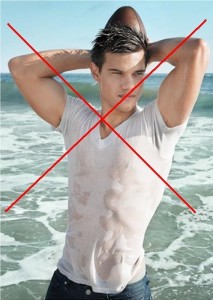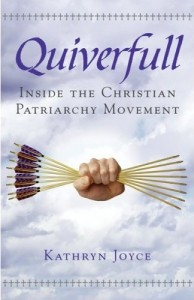The Projection of Hate – Dzhokhar Tsarnaev, Rolling Stone and Right Wing Sex Panic
Posted in Editorials on July 19th, 2013by Elizabeth
Tags: Feminism
Misogyny is a part of many right wing ideologies – religious fundamentalists and Red Pill/MRA/PUA types share it. And it strongly correlates with being generally politically conservative – if you look at the legislation agenda of the Republican party, it would seem that the only thing they care about is oppressing (women’s) sexuality.
One aspect of this worldview is the belief that the only thing that matters about a woman is her appearance. Religious men might cloak this in talking about a woman’s “ability to be a wife and mother” but often they simply mean her capacity as a sex object first and baby machine second. Red Pill types are far more blatant about this. Their constant drumbeat is that physical attraction is the only reason a man would be involved with a woman on any level. The generic Republican crowd expresses this when they insist that feminists are ugly, when they made a big deal about Sarah Palin being hot – to them how attractive you are is evidence of how well you conform to their ideas.
And no matter how poorly they react to a woman based on her appearance, they are more obsessed with women’s sexuality. Efforts to control it, either through sexist comments, legislating reproductive services or using “game” take up a lot of their time and attention. They are vigilant.
I think this explains some of the panic over the Rolling Stone cover featuring Dzhokhar Tsarnaev. There are several different reasons people are offended by the cover. I even empathize, a little bit with people who say that criminals shouldn’t get so much attention, that they shouldn’t be rock stars – that if they want infamy we should give them anonymity. But that’s not what I’m talking about.
Amanda Marcotte wrote about how people are totally losing their minds over the cognitive dissonance that a terrorist could be handsome. There are some people in the world who actually believe that real life is a fairy tale and that the good people are always good looking and the evil people are always ugly. And they can’t handle the cognitive dissonance.
But something else, I saw in the reactions to Marcotte on twitter was something far more sinister.
.@AmandaMarcotte Too bad this "book" didn't need the cover before he was judged for his actions.. You must DREAM of f*cking James Holmes.
— Brandy Charlotte (@FatBrando) July 18, 2013
@AmandaMarcotte You were with Edwards? Hmmm, you've come a long way, baby! (gigs) Dzhokhar is cute like Edwards, right? Start knitting.
— Thomas Fredette (@MAKEMINEMILQ) July 18, 2013
Martin Richard was a handsome boy. You're a piece of shit. "@AmandaMarcotte: Dzhokhar Tsarnaev *is* handsome"
— Sean Agnew (@seanagnew) July 17, 2013
@AmandaMarcotte Eric Robert Rudolph and Ted Bundy were more handsome. Ditto the Menendez brothers. Drop 'em a line. @TwitchyTeam
— Deserto Vulpes (@TheRobertBriggs) July 18, 2013
You *are* stupid. He planted a bomb next to a little kid. MT @AmandaMarcotte Dzhokhar Tsarnaev *is* handsome.
— Jim Treacher (@jtLOL) July 18, 2013
@jtLOL girls like @AmandaMarcotte find misogynists, abusers, emotionally vacant, & narcissistic men handsome…Which is why they r *liberal*
— notwhouthink (@shoopbeedoop) July 18, 2013
@duchessrebecca @AmandaMarcotte Amanda is still thinking with her #ladyparts.
— conservativemuslim (@rightwingmuslim) July 18, 2013
Next up from @AmandaMarcotte: "Stalin & Saddam had such cute hipster mustaches, like, so ironic! Also, you're stupid!" #tcot #BostonBomber
— Chris v Csefalvay (@chrisvcsefalvay) July 18, 2013
@AmandaMarcotte Ted Bundy was also handsome and he liked to kill women that looked just like you. But hey its image that countws right?
— Conservative Citizen (@clarkr3000) July 18, 2013
Amanda Marcotte @AmandaMarcotte does stick a rolled up Rolling Stone mag up her ass and has an orgasm http://t.co/Q5qFgriZ21
— DANEgerus (@DANEgerus) July 18, 2013
They are all filled with incoherent rage by the tweet:
Dzhokhar Tsarnaev *is* handsome. I fail to see what value there is in pretending otherwise. The bad guy isn't always a cartoon.
— Amanda Marcotte (@AmandaMarcotte) July 17, 2013
The responses I’ve highlighted above don’t simply fall into the “don’t glamorize criminals” category or even the “obviously villains are ugly, SHUT UP THEY ARE!” category. This line of reasoning goes:
1. Amanda Marcotte said Dzhokhar Tsarnaev is handsome.
2. Therefore she thinks he’s a good person AND she wants to have sex with him.
It doesn’t really follow, at all. But I would say that this conclusion does fit in with their warped misogyny. Men who objectify every woman they meet are projecting that women must do the same; if a woman says a man is handsome, then she must feel about him the way he feels about attractive women…!
This also fits with their warped view of female sexuality and the “theory” of “hypergamy.” Many men are obsessed with why women like “bad boys” instead of “nice guys.” Simply stating that an evil man is handsome must be proof of some deeper attraction, they think. And here, right here on twitter is a woman, nay, a feminist – admitting it! She must be punished! Don’t let her get away!
It’s not pretty to look at. But there is so much of it to see.





